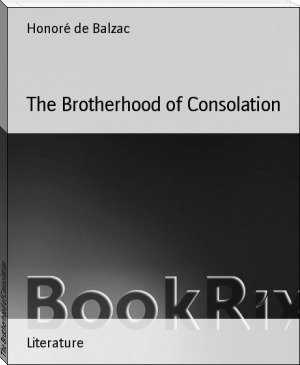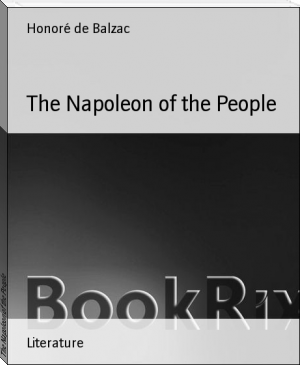The Brotherhood of Consolation by Honoré de Balzac (ereader manga txt) 📖

- Author: Honoré de Balzac
Book online «The Brotherhood of Consolation by Honoré de Balzac (ereader manga txt) 📖». Author Honoré de Balzac
[*] The Country Doctor. Little, Brown & Co., Boston.
Godefroid took the old man's hands and pressed them tenderly, wishing him good-night, and assuring him he would not neglect a single point of his advice.
"All that you have said to me," he added, "is graven in my memory forever."
The old man smiled, expressing no doubts; then he rose, to kneel in his accustomed place. Godefroid retired, joyful in at last sharing the mysteries of that house and in having an occupation, which, feeling as he did then, was to him an untold pleasure.
The next day at breakfast, Monsieur Alain's place was vacant, but no one remarked upon it; Godefroid made no allusion to the cause of his absence, neither did any one question him as to the mission the old man had entrusted to him; he thus took his first lesson in discreetness. Nevertheless, after breakfast, he did take Madame de la Chanterie apart and told her that he should be absent for some days.
"That is good, my child," replied Madame de la Chanterie; "try to do honor to your godfather, who has answered for you to his brothers."
Godefroid bade adieu to the three remaining brethren, who made him an affectionate bow, by which they seemed to bless his entrance upon a painful career.
ASSOCIATION, one of the greatest social forces, and that which made the Europe of the middle-ages, rests on principles which, since 1792, no longer exist in France, where the Individual has now triumphed over the State. Association requires, in the first place, a self-devotion that is not understood in our day; also a guileless faith which is contrary to the spirit of the nation, and lastly, a discipline against which men in these days revolt and which the Catholic religion alone can enforce. The moment an association is formed among us, each member, returning to his own home from an assembly where noble sentiments have been proclaimed, thinks of making his own bed out of that collective devotion, that union of forces, and of milking to his own profit the common cow, which, not being able to supply so many individual demands, dies exhausted.
Who knows how many generous sentiments were blasted, how many fruitful germs may have perished, lost to the nation through the infamous deceptions of the French Carbonari, the patriotic subscriptions to the Champ d'Asile, and other political deceptions which ought to have been grand and noble dramas, and proved to be the farces and the melodramas of police courts. It is the same with industrial association as it is with political association. Love of self is substituted for the love of collective bodies. The corporations and the Hanse leagues of the middle-ages, _to which we shall some day return_, are still impossible. Consequently, the only societies which actually exist are those of religious bodies, against whom a heavy war is being made at this moment; for the natural tendency of sick persons is to quarrel with remedies and often with physicians. France ignores self-abnegation. Therefore, no association can live except through religious sentiment; the only sentiment that quells the rebellions of mind, the calculations of ambition, and greeds of all kinds. The seekers of better worlds ignore the fact that ASSOCIATION has such worlds to offer.
As he walked through the streets Godefroid felt himself another man. Whoever could have looked into his being would have admired the curious phenomenon of the communication of collective power. He was no longer a mere man, he was a tenfold force, knowing himself the representative of persons whose united forces upheld his actions and walked beside him. Bearing that power in his heart, he felt within him a plenitude of life, a noble might, which uplifted him. It was, as he afterwards said, one of the finest moments of his whole existence; he was conscious of a new sense, an omnipotence more sure than that of despots. Moral power is, like thought, limitless.
"To live for others," he thought, "to act with others, all as one, and act alone as all together, to have for leader Charity, the noblest, the most living of those ideal figures Christianity has made for us, this is indeed to live!--Come, come, repress that petty joy, which father Alain laughed at. And yet, how singular it is that in seeking to set myself aside from life I have found the power I have sought so long! Yes, the world of misery will belong to me!"
XII. A CASE TO INVESTIGATE
Godefroid walked from the cloister of Notre-Dame to the avenue de l'Observatoire in such a state of exaltation that he never noticed the length of the way.
When he reached the rue Notre-Dame des Champs at the point where it joins the rue de l'Ouest he was amazed to find (neither of these streets being paved at the time of which we write) great mud-holes in that fine open quarter. Persons walked on planks laid down beside the houses and along the marshy gardens, or on narrow paths flanked on each side by stagnant water which sometimes turned them into rivulets.
By dint of searching he found the house he wanted, but he did not reach it without difficulty. It was evidently an abandoned factory. The building was narrow and the side of it was a long wall with many windows and no architectural decoration whatever. None of these windows, which were square, were on the lower floor, where there was no opening but a very miserable entrance-door.
Godefroid supposed that the proprietor had turned the building into a number of small tenements to make it profitable, for a written placard above the door stated that there were "Several rooms to let." Godefroid rang, but no one came. While he was waiting, a person who went by pointed out to him that the house had another entrance on the boulevard where he might get admittance.
Godefroid followed this advice and saw at the farther end of a little garden which extended along the boulevard a second door to the house. The garden, rather ill-kept, sloped downward, for there was enough difference in level between the boulevard and the rue Notre-Dame des Champs to make it a sort of ditch. Godefroid therefore walked along one of the paths, at the end of which he saw an old woman whose dilapidated garments were in keeping with the house.
"Was it you who rang at the other door?" she asked.
"Yes, madame. Do you show the lodgings?"
On the woman's replying that she did, Godefroid inquired if the other lodgers were quiet persons; his occupations, he said, were such that he needed silence and peace; he was a bachelor and would be glad to arrange with the portress to do his housekeeping.
On this suggestion the portress assumed a gracious manner.
"Monsieur has fallen on his feet in coming here, then," she said; "except on the Chaumiere days the boulevard is as lonely as the Pontine marshes."
"Ah! you know the Pontine marshes?" said Godefroid.
"No, monsieur, I don't; but I've got an old gentleman upstairs whose daughter seems to get her living by being ill, and he says that; I only repeat it. The poor old man will be glad to know that monsieur likes quiet, for a noisy neighbor, he thinks, would kill his daughter. On the second floor we have two writers; they don't come in till midnight, and are off before eight in the morning. They say they are authors, but I don't know where or when they write."
While speaking, the portress was showing Godefroid up one of those horrible stairways of brick and wood so ill put together that it is hard to tell whether the wood is trying to get rid of the bricks or the bricks are trying to get away from the wood; the gaps between them were partly filled up by what was dust in summer and mud in winter. The walls, of cracked and broken plaster, presented to the eye more inscriptions than the Academy of Belles-lettres has yet composed. The portress stopped on the first landing.
"Here, monsieur, are two rooms adjoining each other and every clean, which open opposite to those of Monsieur Bernard; that's the old gentleman I told you of,--quite a proper person. He is decorated; but it seems he has had misfortunes, for he never wears his ribbon. They formerly had a servant from the provinces, but they sent him away about three years ago; and now the young son of the lady does everything, housework and all."
Godefroid made a gesture.
"Oh!" cried the Portress, "don't you be afraid; they won't say anything to you; they never speak to any one. They came here after the Revolution of July, in 1830. I think they're provincial folk ruined by the change of government; they are proud, I tell you! and dumb as fishes. For three years, monsieur, I declare they have not let me do the smallest thing for them for fear they should have to pay for it. A hundred sous on New Year's day, that's all I get out of them. Talk to me of authors, indeed!"
This gossip made Godefroid hope he should get some assistance out of the woman, who presently said, while praising the healthfulness of the two rooms she offered him, that she was not a portress, but the confidential agent of the proprietor, for whom she managed many of the affairs of the house.
"You may have confidence in me, monsieur, that you may! Madame Vauthier, it is well known, would rather have nothing than a single penny that ought to go to others."
Madame Vauthier soon came to terms with Godefroid who would not take the rooms unless he could have them by the single month and furnished. These miserable rooms of students and unlucky authors were rented furnished or unfurnished as the case might be. The vast garret which extended over the whole building was filled with such furniture. But Monsieur Bernard, she said, had furnished his own rooms.
In making Madame Vauthier talk, Godefroid discovered she had intended to keep boarders in the building, but for the last five years had not obtained a single lodger of that description. She lived herself on the ground-floor facing towards the boulevard; and looked after the whole house, by the help of a huge mastiff, a stout servant-girl, and a lad who blacked the boots, took care of the rooms, and did the errands.
These two servants were, like herself, in keeping with the poverty of the house, that of the tenants, and the wild and tangled look of the garden. Both were children abandoned by their parents to whom the widow gave food for wages,--and what food! The lad, whom Godefroid caught a glimpse of, wore a ragged blouse and list slippers instead of shoes, and sabots when he went out. With his tousled head, looking like a sparrow when it takes a bath, and his black hands, he went to measure wood at a wood-yard on the boulevard as soon as he had finished the morning work of the house; and after his day's labor (which ends in wood-yards at half-past four in the afternoon) he returned to his domestic avocations. He went to the fountain of the Observatoire for the water used in the house, which the widow supplied to the tenants, together
 Have you ever thought about what fiction is? Probably, such a question may seem surprising: and so everything is clear. Every person throughout his life has to repeatedly create the works he needs for specific purposes - statements, autobiographies, dictations - using not gypsum or clay, not musical notes, not paints, but just a word. At the same time, almost every person will be very surprised if he is told that he thereby created a work of fiction, which is very different from visual art, music and sculpture making. However, everyone understands that a student's essay or dictation is fundamentally different from novels, short stories, news that are created by professional writers. In the works of professionals there is the most important difference - excogitation. But, oddly enough, in a school literature course, you don’t realize the full power of fiction. So using our website in your free time discover fiction for yourself.
Have you ever thought about what fiction is? Probably, such a question may seem surprising: and so everything is clear. Every person throughout his life has to repeatedly create the works he needs for specific purposes - statements, autobiographies, dictations - using not gypsum or clay, not musical notes, not paints, but just a word. At the same time, almost every person will be very surprised if he is told that he thereby created a work of fiction, which is very different from visual art, music and sculpture making. However, everyone understands that a student's essay or dictation is fundamentally different from novels, short stories, news that are created by professional writers. In the works of professionals there is the most important difference - excogitation. But, oddly enough, in a school literature course, you don’t realize the full power of fiction. So using our website in your free time discover fiction for yourself. 




Comments (0)